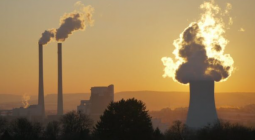Guilbeault Allows Massive Coal Mine Expansion Without Federal Review
Environment Minister Steven Guilbeault is taking fire for allowing work to proceed on what will be North America’s biggest thermal coal mine after the minister failed to order a federal impact assessment of a massive mine expansion in Hinton, Alberta.
Instead, Impact Assessment Agency of Canada (IAAC) President Terence Hubbard announced December 6 that the 630-hectare Coalspur Vista thermal coal expansion will go ahead without review.
The project is expected to extract up to 15 million tonnes of coal per year over 11 years, Ecojustice said in a statement in August.
“When shipped and consumed abroad, burning this amount of coal would lead to 33 million tonnes of carbon pollution released into the atmosphere annually—equivalent to the amount of carbon pollution produced by seven million passenger vehicles in one year,” the statement added. “This comes at a time when the federal government has already committed to banning the export of thermal coal from Canada by 2030.”
“At a time when we are experiencing the catastrophic impacts of climate change—severe droughts, massive forest fires, extreme heat waves—this is no time to allow a massive thermal coal mine to be expanding,” Jesse Cardinal, executive director of Keepers of the Water Society, said in the Ecojustice release. “Doing so would mean turning the dial to high intensity on the climate impacts we are already experiencing, putting society and Indigenous Nations at further risk.”
The federal announcement comes nearly nine months after environmental groups revealed that the project owner, Coalspur Mines, had already begun work on an underground test mine at Vista without waiting for the fisheries permits it required. To date, the mine has operated above ground but not below.
In 2020, then-federal environment minister Jonathan Wilkinson ordered a joint federal-provincial review of both the expansion and the test mine, The Canadian Press recalled earlier this year. That review collapsed when the Supreme Court of Canada ruled that parts of Ottawa’s Impact Assessment Act were unconstitutional.
But by then, the federal Department of Fisheries and Oceans had reviewed plans for both projects and decided it required permits under two different pieces of legislation.
“DFO indicated that the physical activities would require a Fisheries Act authorization,” said a 2021 analysis report from the IAAC. “The physical activities may also potentially require the exercise of powers… such as a Species at Risk Act permit for impacts to Athabasca rainbow trout or other species at risk.”
In August, Ecojustice asked Ottawa to redesignate the project for federal review after the Impact Assessment Act was amended to reflect the Supreme Court decision. “Once expanded, Vista would be the largest thermal coal mine in Canadian history,” the environmental law charity said on behalf of Keepers of the Water and the West Athabasca Watershed Bioregional Society. “The two proposed expansions are expected to have disastrous impacts on surrounding water and land, endangered species, and nearby communities—this includes potential impact on Indigenous communities’ rights to hunt, fish, and gather.”
Hubbard’s brief statement made no direct mention of the earlier history or the Ecojustice request, indicating only that Coalspur “has been actively consulting with numerous Indigenous groups” in the area and would be required to comply with federal and provincial laws.
Julia Levin, associate director, national climate at Environmental Defence Canada, said Guilbeault’s decision not to assess the project “represents massive backtracking on Canada’s efforts to move beyond thermal coal,” the dirtiest of all fossil fuels.
“Canada prides itself on having launched the global Powering Past Coal initiative, introduced rules to stop burning thermal coal, and committed to banning the export of thermal coal by 2023,” she said in a statement. “The decision to allow Vista—already the largest thermal coal mine in Canada—to potentially double its production is out of step with Canada’s actions to date to curb thermal coal use and take climate action.”
Cover photo: flickr




